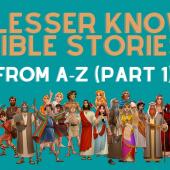Program Type
Summary
A summary of lesser-known Bible Stories from N to Z
Program Aim
To bring to light some interesting stories not often explored in order to bring out the beauty of studying the bible
Scripture References
John 5:39
Theme Song(s)
Give me the bible
Program Audience
Click here to access Part 1
Ask the congregation if they know the story by the title. Get someone in the audience to give a brief 30-second summary. Then expound on each story below in alphabetic order
- (N) Nabal 1 Samuel 25:
A wealthy but stingy man named Nabal, denies David supplies when he's in a serious position of need. After the unhappy exchange, David is enraged, cursing Nabal and his family. His wife Abigail uses her wisdom to plead with David to spare her husband’s household. She apologizes for her husband’s behavior and begs that he take out his vengeance on her instead. Viewing her as a more humble and diplomatic figure, he spares them. This ends up being a blessing in disguise because it saves David from backlash related to the murders. David and Abigail later wed after her husband’s sudden death.
OR
Nineveh:
Did you know Nineveh was the capital of Assyria, one of Israel's greatest enemies? No wonder Jonah was reluctant to save them. - (O) One Hundred men fed with 20 loaves of bread. 2 Kings 4:42-44
Elisha preceded Jesus in feeding a large number of people with limited bread. He caused 20 loaves of bread to be shared with 100 men and there was bread leftover at the end. - (P) Peg
Deborah the prophetess and the Israelite army drove Sisera, the Canaanite general, to a frantic retreat. He took refuge with a desert-dwelling tribe that was an ally of his nation. Unfortunately for him, he chose Jael’s tent, and she was a double agent. She fed Sisera, promised to stand guard, and told him to go to sleep… and then she drove a tent peg through his head. - (Q) Quail - Numbers 11
The children of Israel complained about eating Manna every day. They cried for meat so the Lord sent a strong wind to blow an enormous flock of quail over the camp. For about a days walk in any direction and three feet deep. Those who craved the meat gathered quail but never enjoyed their meal because it brought upon them a severe plague. - (R) Rahab. Joshua
She was a woman who lived in Jericho, in the promised Land and assisted the Israelites in capturing the city. She hid two men who had been sent to scout the city prior to their attack. In the book of Hebrews, she is lauded as an example of a person who lived by faith. Rahab is also a great grandmother of Jesus. - (S) Shiphrah and Puah - Exodus 1
Shiphrah and Puah were two of the midwives assigned to attend Israelite women during childbirth in the years preceding the exodus. As the Israelites’ population increased, the Egyptians felt increasingly threatened and feared the Israelites would take over the nation. To limit their population growth, the king of Egypt gave the midwives a chilling order:
"When you help the Hebrew women in childbirth and observe them on the delivery stool, if it is a boy, kill him; but if it is a girl, let her live" (Ex. 1:16).
But Shiphrah and Puah feared God. They refused to do what the king of Egypt ordered. Deliberately disobeying their leader’s command, they delivered each tiny newborn with all the skill and ability they possessed.
Before long, their disobedience came to the attention of the king, and he summoned them to stand before him.
“‘Why have you done this?’ he asked. ‘Why have you let the boys live?’" (v. 18).
This is where Shiphrah and Puah shine on the pages of biblical history:
Not only were they God-fearing, they were also wise. While they recognized their responsibility to obey their leaders, they also understood that God’s law supersedes man’s law. They knew they could not sin against God by killing the Hebrew babies.
“‘Hebrew women are not like Egyptian women,’ they said to Pharaoh. ‘They are vigorous and give birth before the midwives arrive.’"
Scripture tells us God smiled on their courage and commitment to do what was right. He “was kind to the midwives... and because the midwives feared God” (v. 20-21).
Shiphrah and Puah are powerful, though obscure, examples of doing what’s right no matter what the cost. - (T) Tamar - Genesis 38
A young widow was in a tricky place. The law required that she marry her deceased husband’s brother so she could have children to provide for her and carry on the family name… but her father-in-law Judah absolutely forbid it, basically condemning her to poverty. So she took matters into her own hands, and dressed up like a prostitute, seduced her father-in-law, and had twin sons by him (yes, really). When she was about to be stoned for adultery, she produced proof that Judah was the father. He admitted his guilt, and Tamar was spared.
Less Weird When You Remember: The law requiring a man to marry his brother’s widow was intended to protect childless widows, who were vulnerable to poverty and abuse. Yes, it was totally misused in this case… but even with that, Tamar is mentioned in the line of Jesus, one of three foreign women of questionable past included there to point to God’s grace. - (U) Uzzah - 2 Samuel 6:3–8 and 1 Chronicles 13:7–11
With his brother Ahio, Uzzah drove the cart on which the ark was placed when David sought to bring it up to Jerusalem. When the oxen stumbled, making the ark tilt, Uzzah steadied the ark with his hand, in direct violation of the divine law, and he was immediately killed by the Lord for his error. David, displeased because God had killed Uzzah, called the place where this occurred "Perez-uzzah", which means "to burst out against Uzzah". - (V) Vashti
She was a queen of Persia and the first wife of Persian King Ahasuerus in the Book of Esther. She was banished for her refusal to appear at the king's banquet to show her beauty as the king wished, and Esther was chosen to succeed her as queen.
Some Jewish traditions suggest that the refusal was because she was ordered to appear naked. Ellen White also suggested that the King was intoxicated. - (W) Widow and the Unjust Judge - Luke 18:1–8
This is one of the parables of Jesus. In it, a judge who lacks compassion is repeatedly approached by a woman seeking justice. Initially rejecting her demands, he eventually honours her request so he will not be worn out by her persistence.
Jesus then encourages the people to be persistent in prayer because he is more willing to offer justice than an unjust Judge. - (X) Xerxes
Xerxes is another name for King Ahasuerus, the ex-husband of Queen Vashti and the husband of Queen Esther. - (Y) Yoke of Jeremiah
The Lord spoke to Jeremiah and told him to deliver a message to Zedekiah the King saying: "I will give the entire country over to Nebuchadnezzar king of Babylon, you must serve him. If you choose not to submit to the king of Babylon or bow your neck under his yoke, I will punish your land with the sword, famine and plague, declares the Lord, until I destroy it by his hand. Also do not listen to your false prophets who will lie to you."
A false prophet named Hananiah told the king that the Lord said, "I will break the yoke of the King of Babylon and in two years he will bring back everything king nebuchadnezzar " - (Z) Zedekiah's Demise -
Lost his eyes because of disobedience.
Get Weekly Programs






Comments
- Reply
Permalink- Reply
Permalink- Reply
Permalink- Reply
Permalink- Reply
PermalinkA study plan & material w/ Scripture....Praise God! I'm ready to go for a last minute notice to present a study topic...Bible Events!!!! Saved me big time. You are a blessing- what a mighty God we Serve....All Strength No Sweat !!! (From Secret Commercial:))
- Reply
Permalink- Reply
Permalink- Reply
Permalink